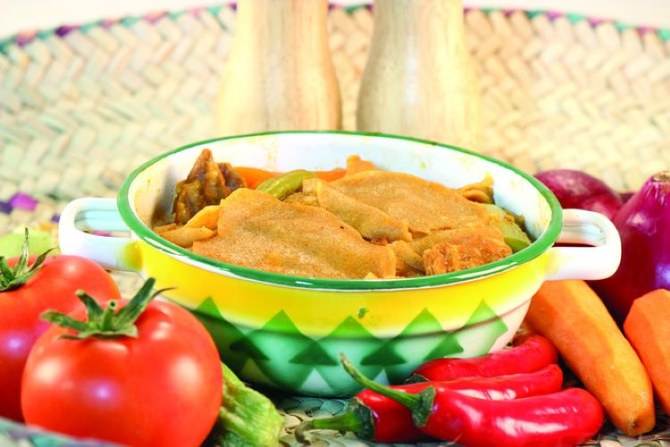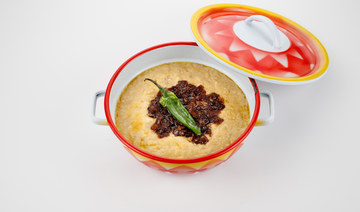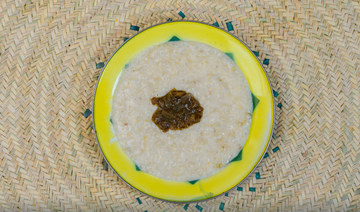RIYADH: Saudi Arabia is divided into 13 provinces, each with traditional local dishes passed from one generation to another.
Each dish indicates the heritage of a region and the local foods tend to correspond with the availability of ingredients. Riyadh, the capital, has its own traditional dishes that locals take pride in.
“It is easy to find local dishes of Riyadh in other regions in the Kingdom, but our local dishes taste different — and better — in Riyadh,” said Hessah Abdulaziz, a local resident.
“I believe (this is) mainly because we are using locally grown vegetables, the same vegetables that were used when these dishes were first created.”
Local dishes in the capital mostly consist of rice, flat breads, meat, and a few spices boasting a richness of flavor. The most popular are matazeez, jareesh, qursan, and mathloutha.
Matazeez is a dish that comprises flat dumplings cooked in a stew of vegetables, tomatoes, meat, and spices. The dumpling dough is made from whole-wheat flour, oil, salt, and water, and is cut into flattened circles.
Jareesh is another beloved local dish that is made from ground wheat, cooked with rice, chopped, and fried onions, vegetables, and chicken.
Qursan is made up of thin layers of fresh bread smothered in a tomato-based vegetable sauce and topped with fresh onions and parsley.
Mathloutha is a popular offering in Riyadh, made up of three dishes in one, consisting of a mixture of rice, jareesh, and qursan. Because of the effort it requires, it is generally served on special occasions such as weddings and during Eid.
For those who have a sweet tooth, the Riyadh table offers a range of traditional deserts and snacks including hininy, mrahif, and kleija
Hininy consists of dates, butter, and brown bread topped with spices such as saffron and cardamom. The dish is usually prepared and eaten during winter.
Mrahif is consumed as a snack with either tea or coffee. It is similar in taste and texture to French crepes, and is prepared from a liquid dough on a frying pan, served with salty fillings made up of cooked green onion, parsley, and a few spices, or with a sweet filling, using ghee and honey.
Kleija is a popular sweet hollow cake, made of flour and stuffed with dates, honey, date molasses, sugar, or nuts. The fillings depend on personal preference, but every family in Riyadh has a jar or two of kleija in their fridge ready to be served.
Today, many traditional Riyadh dishes are found and served in local restaurants, even those ostensibly dedicated to foreign cuisine.
“Riyadh has countless Western restaurants that locals, including me, visit often, but there’s this tendency to have an authentic local dish every once in a while,” said Fahad Al-Mutairi, another resident.
The most popular Saudi restaurants in the capital are Al-Romansiah, Al-Saudi, Najd Village, and Suhail.
Al-Romansiah is a chain serving local dishes using the freshest ingredients. Mathloutha with chicken is their specialty, along with qursan and jareesh.
Al-Saudi is a traditional restaurant, bringing an authentic taste of Riyadh since 1994. It is known for its most delicious kabsa, a rice dish made with either chicken or lamb.
Najd Village is another popular place for local food and is certainly the most renowned. The restaurant serves a range of kabsa dishes and offers a true taste of matazeez.
Suhail is a stunning Saudi restaurant located in the old town, offering original and traditional local fare with a modern twist. It is known for its delicious jareesh, topped with caramelized onions and ghee.































